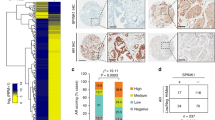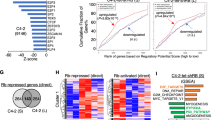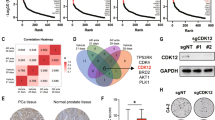Abstract
Castration-resistant prostate cancer (CRPC) remains a major clinical challenge because of the lack of effective targeted therapy for its treatment. The mechanism underlying how CRPC gains resistance toward hormone depletion and other forms of chemotherapy is poorly understood. Research on understanding the factors that drive these processes is desperately needed to generate new therapies to cure the disease. Here, we discovered a fundamental role of S-phase protein kinase 2 (Skp2) in the formation and progression of CRPC. In transgenic adenocarcinoma mouse prostate model, Skp2 depletion leads to a profound repression of prostate tumor growth and distal metastasis and substantially prolonged overall survival. We revealed that Skp2 regulates CRPC through Twist-mediated oncogenic functions including epithelial–mesenchymal transition (EMT) and cancer stem cell (CSC) acquisitions. Mechanistically, Skp2 interacted with Twist and promoted the non-degradative ubiquitination of Twist. Consequently, Skp2 stabilized Twist protein expression by preventing proteasomal degradation of Twist by β-TrCP. We found that Twist overexpression augments CSC self-renewal and population and that Skp2 inhibition reverts Twist’s effects on CSC regulation. Furthermore, genetically depleting or pharmacologically inactivating Skp2 synergistically re-sensitized CRPC cells toward chemotherapies such as paclitaxel or doxorubicin. Together, this study uncovering Skp2-mediated Twist stabilization and oncogenic functions in CRPC offers new knowledge on how CRPC progresses and acquires chemoresistance during tumor progression. It provides proof of principle that Skp2 targeting is a promising approach to combat metastatic CRPC by targeting Twist and CSCs.
This is a preview of subscription content, access via your institution
Access options
Subscribe to this journal
Receive 50 print issues and online access
$259.00 per year
only $5.18 per issue
Buy this article
- Purchase on Springer Link
- Instant access to full article PDF
Prices may be subject to local taxes which are calculated during checkout







Similar content being viewed by others
References
Rescigno P, Buonerba C, Bellmunt J, Sonpavde G, De Placido S, Di Lorenzo G . New perspectives in the therapy of castration resistant prostate cancer. Curr Drug Targets 2012; 13: 1676–1686.
Dayyani F, Gallick GE, Logothetis CJ, Corn PG . Novel therapies for metastatic castrate-resistant prostate cancer. J Natl Cancer Inst 2011; 103: 1665–1675.
Tannock IF, de Wit R, Berry WR, Horti J, Pluzanska A, Chi KN et al. Docetaxel plus prednisone or mitoxantrone plus prednisone for advanced prostate cancer. N Engl J Med 2004; 351: 1502–1512.
Sun S, Sprenger CC, Vessella RL, Haugk K, Soriano K, Mostaghel EA et al. Castration resistance in human prostate cancer is conferred by a frequently occurring androgen receptor splice variant. J Clin Invest 2010; 120: 2715–2730.
Plymate SR, Bhatt RS, Balk SP . Taxane resistance in prostate cancer mediated by AR-independent GATA2 regulation of IGF2. Cancer Cell 2015; 27: 158–159.
Tran C, Ouk S, Clegg NJ, Chen Y, Watson PA, Arora V et al. Development of a second-generation antiandrogen for treatment of advanced prostate cancer. Science 2009; 324: 787–790.
Fizazi K, Scher HI, Molina A, Logothetis CJ, Chi KN, Jones RJ et al. Abiraterone acetate for treatment of metastatic castration-resistant prostate cancer: final overall survival analysis of the COU-AA-301 randomised, double-blind, placebo-controlled phase 3 study. Lancet Oncol 2012; 13: 983–992.
Sun Y, Wang BE, Leong KG, Yue P, Li L, Jhunjhunwala S et al. Androgen deprivation causes epithelial-mesenchymal transition in the prostate: implications for androgen-deprivation therapy. Cancer Res 2012; 72: 527–536.
Yun EJ, Zhou J, Lin CJ, Hernandez E, Fazli L, Gleave M et al. Targeting cancer stem cells in castration-resistant prostate cancer. Clin Cancer Res 2016; 22: 670–679.
Kwok WK, Ling MT, Lee TW, Lau TC, Zhou C, Zhang X et al. Up-regulation of TWIST in prostate cancer and its implication as a therapeutic target. Cancer Res 2005; 65: 5153–5162.
Chan CH, Lee SW, Wang J, Lin HK . Regulation of Skp2 expression and activity and its role in cancer progression. Sci World J 2010; 10: 1001–1015.
Chan CH, Li CF, Yang WL, Gao Y, Lee SW, Feng Z et al. The Skp2-SCF E3 ligase regulates Akt ubiquitination, glycolysis, herceptin sensitivity, and tumorigenesis. Cell 2012; 149: 1098–1111.
Zhao H, Bauzon F, Fu H, Lu Z, Cui J, Nakayama K et al. Skp2 deletion unmasks a p27 safeguard that blocks tumorigenesis in the absence of pRb and p53 tumor suppressors. Cancer Cell 2013; 24: 645–659.
Yang G, Ayala G, De Marzo A, Tian W, Frolov A, Wheeler TM et al. Elevated Skp2 protein expression in human prostate cancer: association with loss of the cyclin-dependent kinase inhibitor p27 and PTEN and with reduced recurrence-free survival. Clin Cancer Res 2002; 8: 3419–3426.
Nguyen PL, Lin DI, Lei J, Fiorentino M, Mueller E, Weinstein MH et al. The impact of Skp2 overexpression on recurrence-free survival following radical prostatectomy. Urol Oncol 2011; 29: 302–308.
Stanbrough M, Bubley GJ, Ross K, Golub TR, Rubin MA, Penning TM et al. Increased expression of genes converting adrenal androgens to testosterone in androgen-independent prostate cancer. Cancer Res 2006; 66: 2815–2825.
Shim EH, Johnson L, Noh HL, Kim YJ, Sun H, Zeiss C et al. Expression of the F-box protein SKP2 induces hyperplasia, dysplasia, and low-grade carcinoma in the mouse prostate. Cancer Res 2003; 63: 1583–1588.
Lin HK, Chen Z, Wang G, Nardella C, Lee SW, Chan CH et al. Skp2 targeting suppresses tumorigenesis by Arf-p53-independent cellular senescence. Nature 2010; 464: 374–379.
Wang H, Sun D, Ji P, Mohler J, Zhu L . An AR-Skp2 pathway for proliferation of androgen-dependent prostate-cancer cells. J Cell Sci 2008; 121: 2578–2587.
Ardiani A, Farsaci B, Rogers CJ, Protter A, Guo Z, King TH et al. Combination therapy with a second-generation androgen receptor antagonist and a metastasis vaccine improves survival in a spontaneous prostate cancer model. Clin Cancer Res 2013; 19: 6205–6218.
Gingrich JR, Barrios RJ, Kattan MW, Nahm HS, Finegold MJ, Greenberg NM . Androgen-independent prostate cancer progression in the TRAMP model. Cancer Res 1997; 57: 4687–4691.
Cookson MS, Roth BJ, Dahm P, Engstrom C, Freedland SJ, Hussain M et al. Castration-resistant prostate cancer: AUA guideline. J Urol 2013; 190: 429–438.
Haider M, Zhang X, Coleman I, Ericson N, True LD, Lam HM et al. Epithelial mesenchymal-like transition occurs in a subset of cells in castration resistant prostate cancer bone metastases. Clin Exp Metastasis 2016; 33: 239–248.
Kwilas AR, Ardiani A, Dirmeier U, Wottawah C, Schlom J, Hodge JW . A poxviral-based cancer vaccine the transcription factor twist inhibits primary tumor growth and metastases in a model of metastatic breast cancer and improves survival in a spontaneous prostate cancer model. Oncotarget 2015; 6: 28194–28210.
Marchiani S, Tamburrino L, Nesi G, Paglierani M, Gelmini S, Orlando C et al. Androgen-responsive and -unresponsive prostate cancer cell lines respond differently to stimuli inducing neuroendocrine differentiation. Int J Androl 2010; 33: 784–793.
Chan CH, Lee SW, Li CF, Wang J, Yang WL, Wu CY et al. Deciphering the transcriptional complex critical for RhoA gene expression and cancer metastasis. Nat Cell Biol 2010; 12: 457–467.
Chen ZJ . Ubiquitination in signaling to and activation of IKK. Immunol Rev 2012; 246: 95–106.
Lee HJ, Li CF, Ruan D, Powers S, Thompson PA, Frohman MA et al. The DNA damage transducer RNF8 facilitates cancer chemoresistance and progression through Twist activation. Mol Cell 2016; 63: 1021–1033.
Zhong J, Ogura K, Wang Z, Inuzuka H . Degradation of the transcription factor Twist, an oncoprotein that promotes cancer metastasis. Discov Med 2013; 15: 7–15.
Wei S, Chu P, Chuang H, Hung W, Kulp S, Chen C . Targeting the oncogenic E3 ligase Skp2 in prostate and breast cancer cells with a novel energy restriction- mimetic agent. PLOS One 2012; 7: e47298.
Kalluri R, Weinberg RA . The basics of epithelial-mesenchymal transition. J Clin Invest 2009; 119: 1420–1428.
Polyak K, Weinberg RA . Transitions between epithelial and mesenchymal states: acquisition of malignant and stem cell traits. Nat Rev Cancer 2009; 9: 265–273.
Dave N, Guaita-Esteruelas S, Gutarra S, Frias A, Beltran M, Peiro S et al. Functional cooperation between Snail1 and twist in the regulation of ZEB1 expression during epithelial to mesenchymal transition. J Biol Chem 2011; 286: 12024–12032.
Puhr M, Hoefer J, Schafer G, Erb HH, Oh SJ, Klocker H et al. Epithelial-to-mesenchymal transition leads to docetaxel resistance in prostate cancer and is mediated by reduced expression of miR-200c and miR-205. Am J Pathol 2012; 181: 2188–2201.
Marin-Aguilera M, Codony-Servat J, Reig O, Lozano JJ, Fernandez PL, Pereira MV et al. Epithelial-to-mesenchymal transition mediates docetaxel resistance and high risk of relapse in prostate cancer. Mol Cancer Ther 2014; 13: 1270–1284.
Johnson S, Chen H, Lo P . In vitro tumorsphere formation assays. Bio Protoc 2013; 3: e325.
Chan CH, Morrow JK, Li CF, Gao Y, Jin G, Moten A et al. Pharmacological inactivation of Skp2 SCF ubiquitin ligase restricts cancer stem cell traits and cancer progression. Cell 2013; 154: 556–568.
Chiaverotti T, Couto SS, Donjacour A, Mao JH, Nagase H, Cardiff RD et al. Dissociation of epithelial and neuroendocrine carcinoma lineages in the transgenic adenocarcinoma of mouse prostate model of prostate cancer. Am J Pathol 2008; 172: 236–246.
Wang W, Epstein JI . Small cell carcinoma of the prostate. A morphologic and immunohistochemical study of 95 cases. Am J Surg Pathol 2008; 32: 65–71.
Zhang D, Park D, Zhong Y, Lu Y, Rycaj K, Gong S et al. Stem cell and neurogenic gene-expression profiles link prostate basal cells to aggressive prostate cancer. Nat Commun 2016; 7: 1–15.
Grasso CS, Wu YM, Robinson DR, Cao X, Dhanasekaran SM, Khan AP et al. The mutational landscape of lethal castration-resistant prostate cancer. Nature 2012; 487: 239–243.
Robinson D, Van Allen EM, Wu YM, Schultz N, Lonigro RJ, Mosquera JM et al. Integrative clinical genomics of advanced prostate cancer. Cell 2015; 161: 1215–1228.
Chan CH, Gao Y, Moten A, Lin HK . Novel ARF/p53-independent senescence pathways in cancer repression. J Mol Med (Berl) 2011; 89: 857–867.
Lu W, Liu S, Li B, Xie Y, Izban M, Ballard B et al. SKP2 loss destabilizes EZH2 by promoting TRAF6-mediated ubiquitination to suppress prostate cancer. Oncogene 2017; 36: 1364–1373.
Zhao H, Lu Z, Bauzon F, Fu H, Cui J, Locker J et al. P27T187A knockin identifies Skp2/Cks1 pocket inhibitors for advanced prostate cancer. Oncogene 2016. 1–11.
Wang Z, Gao D, Fukushima H, Inuzuka H, Liu P, Wan L et al. Skp2: a novel potential therapeutic target for prostate cancer. Biochim Biophys Acta 2012; 1825: 11–17.
Yang Y, Lu Y, Wang L, Mizokami A, Keller ET, Zhang J et al. Skp2 is associated with paclitaxel resistance in prostate cancer cells. Oncol Rep 2016; 36: 559–566.
Shiota M, Yokomizo A, Tada Y, Inokuchi J, Kashiwagi E, Masubuchi D et al. Castration resistance of prostate cancer cells caused by castration-induced oxidative stress through Twist1 and androgen receptor overexpression. Oncogene 2010; 29: 237–250.
Chan CH, Morrow JK, Zhang S, Lin HK . Skp2: a dream target in the coming age of cancer therapy. Cell Cycle 2014; 13: 679–680.
Carrano A, Eytan E, Hershko A, Pagano M . SKP2 is required for ubiquitin-mediated degradation of the CDK inhibitor p27. Nat Cell Biol 1999; 1: 193–199.
Yu ZK, Gervais JL, Zhang H . Human CUL-1 associates with the SKP1/SKP2 complex and regulates p21(CIP1/WAF1) and cyclin D proteins. Proc Natl Acad Sci USA 1998; 95: 11324–11329.
Kitagawa M, Lee SH, McCormick F . Skp2 suppresses p53-dependent apoptosis by inhibiting p300. Mol Cell 2008; 29: 217–231.
Wu L, Grigoryan AV, Li Y, Hao B, Pagano M, Cardozo TJ . Specific small molecule inhibitors of Skp2-mediated p27 degradation. Chem Biol 2012; 19: 1515–1524.
Chen Q, Xie W, Kuhn D, Voorhees P, Lopez-Girona A, Mendy D et al. Targeting the p27 E3 ligase SCFSkp2 results in p27- and Skp2-mediated cell-cycle arrest and activation of autophagy. Blood J 2008; 111: 4690–4699.
Oh M, Lee JH, Moon H, Hyun YJ, Lim HS . A chemical inhibitor of the Skp2/p300 interaction that promotes p53-mediated apoptosis. Angew Chem Int Ed Engl 2016; 55: 602–606.
Inuzuka H, Gao D, Finley LW, Yang W, Wan L, Fukushima H et al. Acetylation-dependent regulation of Skp2 function. Cell 2012; 150: 179–193.
Acknowledgements
We sincerely appreciate Dr Keiichi I Nakayama for providing Skp2+/− mice. This work was supported by the Stony Brook School of Medicine and Cancer Center Fund, the Feldstein Medical Foundation Award, a NYS grant (DOH01-C31845GG-3450000) and a NIH grant (5 K22 CA181412) to C-HC, and a MOHW grant (MOHW103-TDU-M-221-123017) and a NHRI grant (CA-106-PP-36) to C-FL, as well as NIH grants (R01 CA182424 and R01CA193813) to H-KL.
Author information
Authors and Affiliations
Corresponding authors
Ethics declarations
Competing interests
The authors declare no conflict of interest.
Additional information
Supplementary Information accompanies this paper on the Oncogene website
Supplementary information
Rights and permissions
About this article
Cite this article
Ruan, D., He, J., Li, CF. et al. Skp2 deficiency restricts the progression and stem cell features of castration-resistant prostate cancer by destabilizing Twist. Oncogene 36, 4299–4310 (2017). https://doi.org/10.1038/onc.2017.64
Received:
Revised:
Accepted:
Published:
Issue Date:
DOI: https://doi.org/10.1038/onc.2017.64
This article is cited by
-
Ubiquitination Process Mediates Prostate Cancer Development and Metastasis through Multiple Mechanisms
Cell Biochemistry and Biophysics (2024)
-
Skp2-mediated MLKL degradation confers cisplatin-resistant in non-small cell lung cancer cells
Communications Biology (2023)
-
MYOD-SKP2 axis boosts tumorigenesis in fusion negative rhabdomyosarcoma by preventing differentiation through p57Kip2 targeting
Nature Communications (2023)
-
TWIST1 induces proteasomal degradation of β-catenin during the differentiation of ovarian cancer stem-like cells
Scientific Reports (2022)
-
p97/VCP is highly expressed in the stem-like cells of breast cancer and controls cancer stemness partly through the unfolded protein response
Cell Death & Disease (2021)



